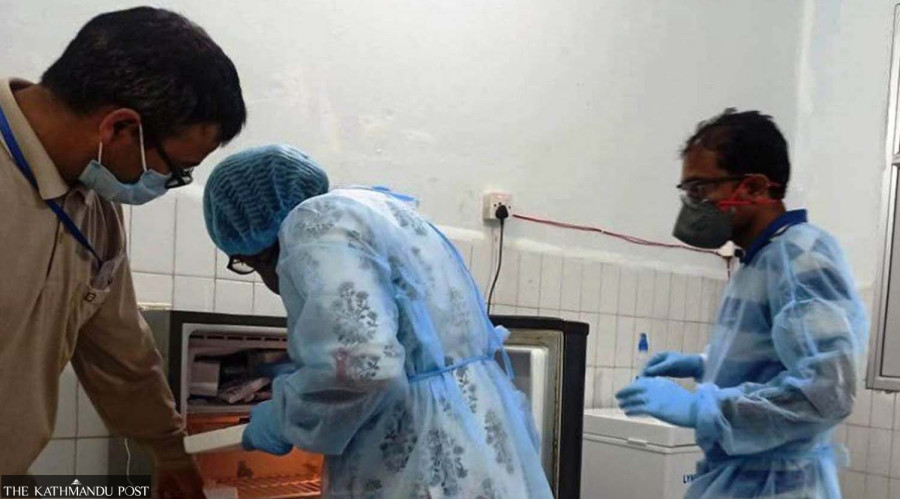Health
Most polymerase chain reaction test labs shut for months
Decline in Covid-19 cases and shortage of resources blamed amid worries over new surge in India spilling over
Arjun Poudel
Of the 17 people who tested positive for Covid-19 on Thursday, most were migrants who had returned from India. It was the highest number of positive cases recorded in a single day in the past 138 days.
According to the data provided by the Ministry of Health and Population, 28 people had tested positive for the coronavirus on November 6. The number of infected cases then declined to a single digit and sometimes, even zero.
With the detection of 17 cases in a single day, especially among people arriving home from India, the Ministry of Health and Population have alerted the agencies concerned about the risks, asking them to step up surveillance.
The Department of Health Services has asked relevant health agencies to step up measures in view of a surge in Covid-19 cases in India, said Dr Shrawan Kumar Mishra, chief of the Provincial Public Health Laboratory in Madhesh. “We have also activated our health desks at Nepal-India border points.”
The problem, however, is that almost all polymerase chain reaction (PCR) laboratories set up in the districts have been shut for months. The contract period of lab technicians expired months ago, which means the laboratories do not have human resources required to run those facilities or carry out testing on swab samples of suspected cases.
Moreover, most districts in the Tarai region bordering India do not have health desks.
Experts say that the rise in new cases in India is a matter of concern in Nepal given the uninterrupted cross-border movement. Thousands of people from both countries enter each other’s territories every day, on top of the large number of those who use unregulated points on the porous border to enter the other side.
“Of the eight districts in Madhesh province, health desks have been set up at entry points in only four districts,” said Mishra. “We have asked for at least 13 health desks in the districts where the cross-border movement of people is high, but our demands have yet to be heeded.”
Officials said PCR testing is available only at the Provincial Public Health Laboratory. Other laboratories in seven districts are not even in operation.
Authorities let go of 20 lab technicians at the Provincial Public Health Laboratory, added Mishra.
Health workers serving in the districts complained that ministry officials had directed them to step up surveillance and take other measures to control the spread of the coronavirus, but in the absence of trained human resources they were unable to increase the number of PCR tests.
India on Saturday recorded six deaths and 1,590 fresh coronavirus infections, the highest in 146 days, according to media reports.
Several states and territories of India, including Delhi, Maharashtra, Gujarat, Tamil Nadu,Uttar Pradesh, Bihar, West Bengal, Uttarakhand and Telangana recorded a surge in new cases. Uttar Pradesh, Bihar, West Bengal and Uttarakhand border Nepal.
Scientists in India say that a new sub-variant of Covid-19, XBB.1.16 is responsible for the recent surge in cases. They, however, said that the people in India have developed a hybrid immunity due to vaccination and natural infection, so the present Covid-19 variant will not lead to hospitalisations and severity. The government has advised people to wear face masks, avoid crowds and complete their vaccination doses, if they have not done so already.
Infectious disease experts as well as virologists in Nepal said that at present, there is no need to panic about reports of a new Covid-19 surge in India. However, they added that the authorities in the country must stay vigilant and monitor if the surge in India is caused by a new virus variant. They were also advised to keep an eye on the deaths, hospitalisations and the severity rate in India.
“If the surge is caused by a new virus variant in India and the virus variant is new to Nepal, it will definitely result in a spike in cases in Nepal as well,” said Dr Sher Bahadur Pun, chief of Clinical Research Unit at Sukraraj Tropical and Infectious Disease Hospital.
Nepal had witnessed the second and third waves of Covid-19 pandemic after the virus wreaked havoc in India. In 2021, more than 8,000 people died of the infection in Nepal during the second wave of the pandemic triggered by the Delta variant. Hundreds of thousands of people were infected during the third wave of the pandemic caused by the Omicron variant.
Meanwhile, health ministry officials blamed lack of human resources in most of the PCR labs set up around the country to a decline in Covid-19 cases and financial constraints. “The PCR laboratories are not in operation,” said Dr Samir Kumar Adhikari, joint spokesperson for the ministry. “If needed, or if the risk increases, we will hire technicians again and bring those laboratories back in operation.”
As many as 12,020 Covid-related deaths have been reported in Nepal, according to an official count.




 11.84°C Kathmandu
11.84°C Kathmandu















